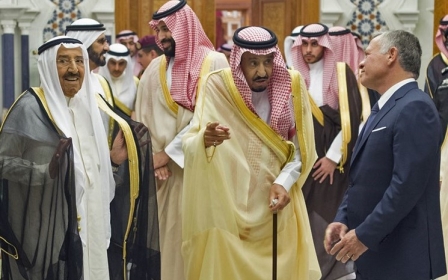Saudi levy on foreign workers pushes thousands to leave country

Thousands of foreign workers are leaving Saudi Arabia after the Gulf kingdom imposed a tax on companies that hire overseas workers.
The departure of workers comes as Saudi Crown Prince Mohammed bin Salman introduced a levy to encourage companies to hire local workers.
Official government figures indicate that at least 700,000 foreigners have left the kingdom since the beginning of 2017, when the levy was introduced.
Government figures indicate that a majority of workers leaving Saudi Arabia are from the building and construction industries - sectors dominated by labourers from South Asia.
Economists see the departure of foreign workers as likely to increase, as many face rising living costs due to the government reforms.
"Around 53 percent of expats earn less than $800 (SRA 3000) per month, and most of them work in the building and construction sector, where purchasing power is weak," Mazen al-Sudairi, who heads research at the Saudi-based Al-Rajhi Capital, told the Financial Times.
The levy means that any Saudi company that chooses to hire foreigners will pay a charge of $80 (SRA 300) per worker each month, while companies that employ more foreigners than Saudi nationals are charged charged $106 (SRA 400) per employee.
The tax is set to increase in 2019 to $133 (SRA 500) per foreign employee or to $160 (SRA 600) if they primarily hire foreigner workers.
Local businesses criticised the Saudi government, urging it to reform the levy - with Saudi officials hinting at plans to relax the rules, according to Al-Watan newspaper.
The Council of Saudi Chambers on Wednesday urged Riyadh to exempt micro, small and medium businesses from the expat levy.
The departure of workers comes as Mohammed bin Salman continues his drive as part of Vision 2030 to encourage local Saudis to take up jobs in the private sector.
Vision 2030 aims to modernise the Saudi economy and wean the Gulf kingdom from its over-reliance on oil money for its economy.
One of the many proposals put forward by the crown prince is his goal of creating 1.2 million private sector jobs by 2020.
But figures showed that Saudis had not been filling positions left behind by foreigners, with government figures showing local unemployment had risen to 12.9 percent.
Reforms were triggered after a period of low oil prices put the Saudi economy in crisis. The building and construction were impacted heavily by the oil prices.
New MEE newsletter: Jerusalem Dispatch
Sign up to get the latest insights and analysis on Israel-Palestine, alongside Turkey Unpacked and other MEE newsletters
Middle East Eye delivers independent and unrivalled coverage and analysis of the Middle East, North Africa and beyond. To learn more about republishing this content and the associated fees, please fill out this form. More about MEE can be found here.




